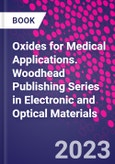Oxides for Medical Applications reviews the most important advances of oxides with optical, magnetic and electronic properties for biomedical applications. Owing to their unusual properties, oxides are expected to play a significant role in the prevention or early treatment of diseases. In addition to catalytically active artificial enzymes based on oxide materials-the book provides comprehensive coverage of the most relevant categories of oxide materials and their properties and applications. Since magnetic oxides are used extensively for a wide range of medical applications, there are numerous chapters that address these materials, including LSMO nanoparticles, ferrites, nanocatalysts, and more.
Finally, practical considerations for the translation of these materials from the lab to the clinic are reviewed, including biocompatibility and toxicity of oxide nanoparticles, making this a suitable resource for researchers and practitioners in materials science and engineering in academia and the clinic.
Please Note: This is an On Demand product, delivery may take up to 11 working days after payment has been received.
Table of Contents
1. An overview of biomedical applications of oxide materials2. Particle Specifications of Oxide Materials for Biomedical Applications
3. An Overview on the Traditional Methods of Synthesis of Oxide Nanoparticles for Medical Applications
4. Synthesis of Graphene & Graphene Oxides and Their Medical Applications
5. Synthesis of Silica Oxide Nanoparticles and Their Medical Applications
6. Synthesis of TiO2 Nanostructures and Their Medical Applications
7. Synthesis of ZnO Nanostructures and Their Medical Applications
8. Rare Earth Oxides and Their Medical Applications
9. Synthesis of Iron based Nanoparticles by Chemical Methods and Their Medical Applications
10. Core-shell Oxide Nanoparticles and Their Biomedical Applications
11. Role of LSMO Magnetic Nanoparticles in Nanomedicine
12. Zinc Ferrite Nanoparticles and Their Biomedical Applications
13. Magnetic Nanoparticle and Enzyme Interface
14. Magnetic Recyclable Nanocatalysts for Cancer Treatment
15. Catalytically Active Nanomaterials as Artificial Enzymes
16. Oxides, Oxidative Stress and Cellular aging
17. Oxides and Neuropsychiatric and Neurodegenerative Disorders
18. Zirconia and its Derivatives and Their Medical Applications
19. ROS mediated pathogens killed by ZnO and MgO Nanoparticles
20. Oxides Nanoparticles in context of Covid-19 Detection
21. Biocompatibility and Toxic effects of oxide nanoparticles: Implications for Public Health and Risk Assessment
Authors
Piyush Kumar Associate Professor, UPES Dehradun, India.Dr. Piyush Kumar is an Associate Professor at School of Health Sciences & Technology, UPES, Dehradun, India. He did his M.Sc. in Biophysics (2003-2005, Govind Ballabh Pant University of Agriculture and Technology) and Ph.D. in Biochemistry (2006-2010, Govind Ballabh Pant University of Agriculture and Technology, Pantnagar, Uttarakhand). He has worked as a Research Associate at Indian Institute of Technology Roorkee, India, during 2010-2014 and as a MHRD post-doc researcher at the same institute during 2014-2017 and as Assistant Professor at Department of Biochemistry, Central University of Haryana, India, during 2017-2020. Dr. Kumar's research contributions are highly interdisciplinary. His research interests are Nanobiosensors, functionalized nanomaterials, and applications of probiotic enzymes in value addition of food. He has actively worked in the designing and constructing of Aptasensors and nanoengineered surface modification strategies for pathogenic bacteria and hazardous xenobiotic molecules, nano and natural products based combinatorial strategies to control pathogens and therapeutic applications probiotic enzymes.
Ganeshlenin Kandasamy Assistant Professor, Department Biomedical Engineering, Vel Tech Rangarajan Dr. Sagunthala R&D Institute of Science and Technology, Chennai, India. Dr. Ganeshlenin Kandasamy has completed his Masters in Nanotechnology from Karunya University, Coimbatore & PhD from Shiv Nadar University, Delhi NCR in 2019 with specialization in "Nanotechnology for Biomedical Applications�. He is currently working as an Assistant. Professor in the Department Biomedical Engineering, Vel Tech Rangarajan Dr. Sagunthala R&D Institute of Science and Technology, Chennai, India. He has published several papers in reputable journals like J. Coll. & Inter. Sci., J. Mol. Liq., ACS Omega, RSC Adv., and has reviewed manuscripts for well-known publishers. His research interests include the synthesis, characterization, and optimization of multifunctional nanoparticles - especially spinel ferrite nanoparticles and carbon quantum dots (CQDs), their polymeric co-encapsulation with potential CTDs, and subsequent application in MRI, fluorescence imaging, MFH based thermotherapy, and combined thermo-/chemo-therapies for the treatment of different type of cancers. Jitendra Pal Singh Ramanujan Fellow, Department of Sciences, Manav Rachna University, Faridabad, Haryana, India.Jitendra Pal Singh is the Ramanujan Fellow at the Manav Rachna University, Faridabad, India. His research interests are irradiation studies in nanoferrites, thin films, and magnetic multilayers, including the synthesis of ferrite nanoparticles and thin films, determining the magnetic, optical, and dielectric response of ferrites, and irradiation and implantation effects in ferrite thin films and nanoparticles.
Pawan Kumar Maurya Central University of Haryana, Mahendergarh (Haryana), INDIA. Prof. Pawan Kumar Maurya is Dean, School of Life Long Learning & Head of Department of Biochemistry, Central University of Haryana, India. He has done a PhD from the University of Allahabad (A Central University), India & post-doctoral training from Universidade Federal de Sao Paulo-UNIFESP, Brazil; Taipei Medical University (TMU) and National Taiwan University (NTU), Taiwan. He has more than 14 years of teaching and research experience. He is working on biochemical diagnostics, nanomedicine, and clinical biochemistry. He has published over 75 research articles in reputed journals. He has also edited of six books published from Elsevier, USA and Springer-Nature, Singapore. He is recipient of prestigious fellowships: Science without Borders (Government of Brazil) and National Science Council, Taiwan.







